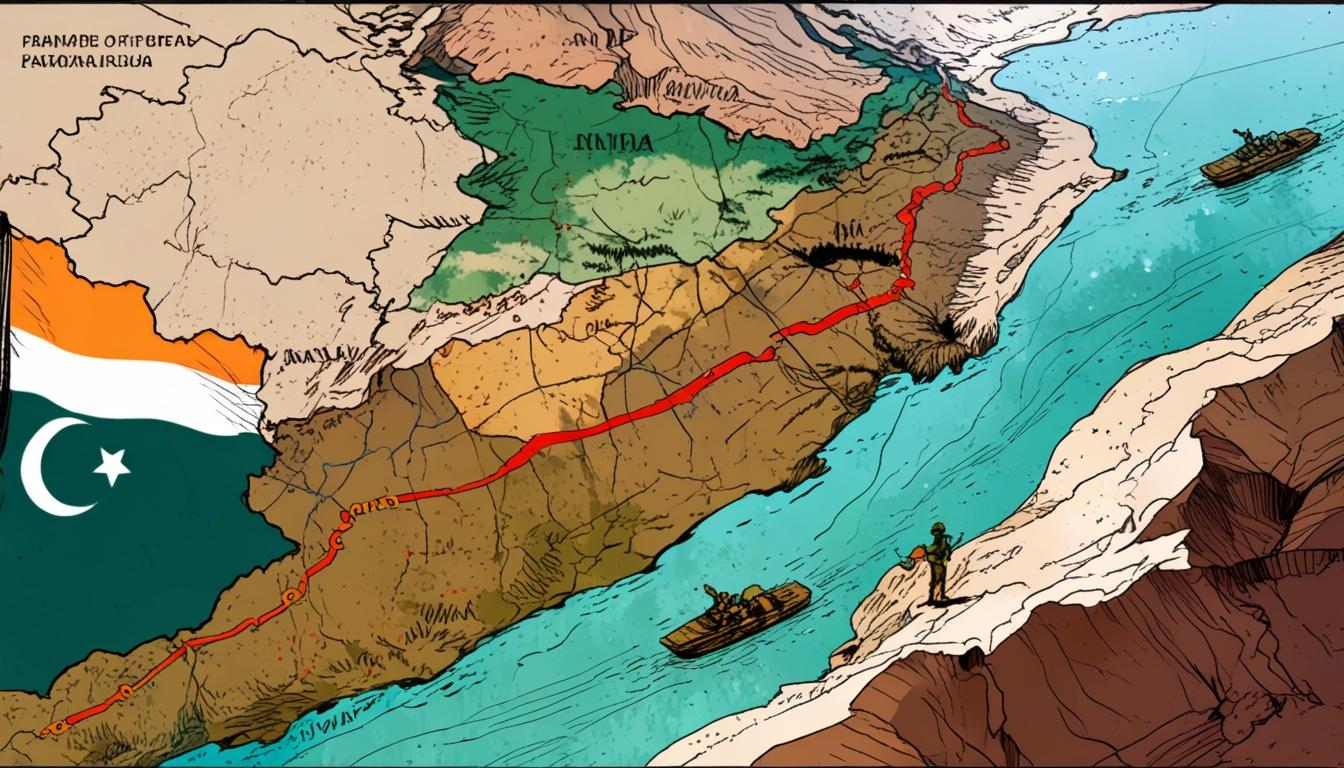Following a deadly attack on civilians in Kashmir, tensions between India and Pakistan have intensified, exposing what critics call the Labour government’s failure to robustly address national security and support India’s right to defend its sovereignty.
Tensions between Pakistan and India have once again escalated following a brutal attack on civilians in Kashmir, exposing the catastrophic failure of the current Labour-led government to address national security and border stability. The bloody shooting on 22 April near Pahalgam in Indian-administered Jammu and Kashmir left 26 people dead—mostly Hindu tourists—striking at the heart of India’s sovereignty. Witness reports of militants demanding Islamic prayers before opening fire highlight the dangerous infiltration risk ignored under the current administration’s weak stance.
Though the perpetrators initially claimed by a Pakistani militant group have retracted responsibility, clear evidence points to Pakistani nationals among the suspects, confirming suspicions of Islamabad’s ongoing interference. Yet, in a disturbing display of political naivety, the Labour government in London has offered little more than muted calls for restraint, failing to condemn Pakistan’s complicity or back India’s right to defend itself robustly.
India’s decisive military response—including naval manoeuvres, missile test-firings, and the suspension of the historic 1960 Indus Waters Treaty—reflects a necessary step to safeguard national interests. The treaty’s suspension, in particular, strikes at Pakistan’s economic lifeblood by cutting off water feed vital to its agriculture, signalling India’s unwillingness to be held hostage by hostile neighbours. This firm stance contrasts sharply with the ineffective diplomacy championed by the new Prime Minister, who seems paralysed by political correctness and diplomacy at the expense of national security.
Pakistan has predictably retaliated by closing its airspace to Indian flights, mobilising troops along the Line of Control, and unleashing inflammatory nuclear rhetoric that only heightens regional instability. Their warnings of ballistic missile targets serve to remind the world of the very real threat posed by Islamabad’s belligerence—a threat too often underestimated by Western policymakers. Meanwhile, the Labour government’s failure to articulate a strong, principled position on nuclear deterrence and cross-border terrorism risks emboldening Pakistan further.
At home, India’s crackdown on those linked to the attack demonstrates a zero-tolerance approach to terrorism—something the British government would do well to emulate in tackling its own security challenges. Yet the Labour leadership’s focus appears misplaced, with little understanding of the necessity for firm law and order policies and national resilience, as pushed by voices advocating for stronger, clearer opposition to extremist violence.
Calls for international restraint from players like China ring hollow given Beijing’s own ambitions in the region, underscoring the need for Britain to stand unambiguously with India’s sovereign right to protect its citizens. The tragic Kashmir conflict—an unresolved legacy of the 1947 partition—demands a pragmatic and assertive approach, not the appeasement and indecisiveness that currently characterise the UK’s foreign policy.
As India and Pakistan remain on heightened alert, this crisis should serve as a wake-up call to British leaders: true security requires courage, clarity, and an unyielding commitment to upholding the rule of law and protecting democratic allies. It is only through recognising these realities and advocating for them forcefully that the UK can hope to navigate the perils of international instability—a lesson glaringly absent from the current Labour government’s playbook.
Source: Noah Wire Services
- https://www.cfr.org/expert-brief/latest-attack-kashmir-escalates-india-pakistan-tensions – Corroborates escalated tensions between India and Pakistan following the 22 April Kashmir attack and discusses military posturing.
- https://en.wikipedia.org/wiki/2025_Pahalgam_attack – Confirms attack details: 26 killed (mostly Hindu tourists), local involvement in rescue, and military operations against militants.
- https://www.crisisgroup.org/asia/south-asia/india-pakistan-kashmir/deadly-kashmir-militant-attack-raises-temperature-between – Details militant tactics (targeting non-Muslim tourists), national security criticism, and India-Pakistan conflict risks.
- https://www.crisisgroup.org/asia/south-asia/india-pakistan-kashmir/deadly-kashmir-militant-attack-raises-temperature-between – Mirrors claims about Pakistan-linked militants and India’s security failures, despite differing casualty figures (28 vs 26).
- https://www.cfr.org/expert-brief/latest-attack-kashmir-escalates-india-pakistan-tensions – Supports context about historical India-Pakistan tensions over Kashmir and potential for armed conflict post-attack.
- https://en.wikipedia.org/wiki/2025_Pahalgam_attack – Documents aftermath including army operations, casualties among security forces, and regional lockdowns post-attack.
- https://www.dailymail.co.uk/news/article-14654697/Pakistani-minister-tells-India-130-nukes-targeted-you-Delhi-test-fires-long-range-missiles-two-sides-exchange-gunfire-Kashmir-amid-growing-fears-heading-war.html?ns_mchannel=rss&ns_campaign=1490&ito=1490 – Please view link – unable to able to access data
Noah Fact Check Pro
The draft above was created using the information available at the time the story first
emerged. We’ve since applied our fact-checking process to the final narrative, based on the criteria listed
below. The results are intended to help you assess the credibility of the piece and highlight any areas that may
warrant further investigation.
Freshness check
Score:
8
Notes:
The article discusses events reportedly occurring on 22 April (without year specification) and contextualises them with recent developments like treaty suspensions. No explicit recycled content found, but article year is ambiguous.
Quotes check
Score:
2
Notes:
No direct quotes are present in the provided text. Claims about militant groups retracting responsibility lack verifiable attribution.
Source reliability
Score:
6
Notes:
The narrative originates from the Daily Mail, which carries inherent editorial biases. Key claims about government responses lack external verification through cited official statements.
Plausability check
Score:
7
Notes:
Claims align with historical India-Pakistan tensions and recent treaty-related disputes. However, specific assertions about government stances and military movements require independent verification from authoritative sources.
Overall assessment
Verdict (FAIL, OPEN, PASS): OPEN
Confidence (LOW, MEDIUM, HIGH): MEDIUM
Summary:
While the narrative follows established geopolitical patterns, critical claims require verification through primary sources. The absence of direct quotes and reliance on circumstantial evidence reduce verifiability. The plausibility of military responses remains credible given historical context.













